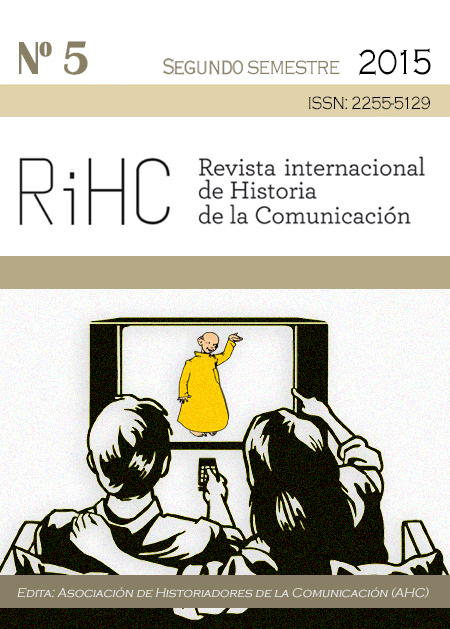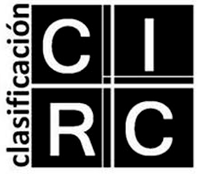La representación de los países del sur de Europa en el diario Bild durante los años centrales de la crisis económica, 2008-2012
DOI:
https://doi.org/10.12795/RiHC.2015.i05.06Keywords:
sensacionalismo, crisis, Grecia, Alemania, BildAbstract
En esta investigación se analiza la cobertura del diario sensacionalista alemán Bild sobre la situación en Grecia durante los años centrales de la crisis de la zona euro. ¿Qué mensaje ha proporcionado Bild a sus lectores sobre la crisis? ¿Cómo se representa la complejidad de la crisis en el vocabulario de un diario sensacionalista? ¿Ha dirigido Bild una campaña propagandística contra Grecia? Este artículo trata de ofrecer respuestas a estas preguntas a través de un método basado en el análisis del discurso. El resultado confirma que Bild, con un discurso plagado de estereotipos, exageraciones y medias verdades, presenta a Alemania como un país trabajador, honesto y responsable, en oposición al despilfarro, la corrupción y la ruina de Grecia.
Downloads
References
ASCHMANN, B., SALEWSKI, M. (2005): Das Bild des “Anderen”. Politische Wahrnehmung im 19. und 20. Jahrhundert, Stuttgart, Steiner.
BAKKER, B., FELMAN, J. (2015): “Los ricos y la Gran Recesión” en Finanzas y desarrollo, v. 52, n. 2, pp. 38-40.
BARKER, C., GALASINSKI, D. (2001): Cultural Studies and Discourse Analysis, Londres, Sage.
BUSCH, D. (2005): Das Bild Griechenlands zwischen Fremd- und Selbstwahrnehmung: Eine Untersuchung der deutschen und griechischen Presseberichterstattung über die Vorbereitungen für die Olympischen Spiele 2004 in Athen, Berlin, Frank & Timme.
DE CILLIA, R., REISIGL, M. y WODAK, R. (1999): “The discursive construction of national identities” en Discourse & Society, v. 10, pp. 149-173.
DERVIS, K. (2013): “Europa: perspectivas para el futuro” en Temas para el debate, n. 224, pp. 19-21.
FÜHRER, K.C. (2007): “Erfolg und Macht von Axel Springers „Bild“-Zeitung in den 1950er-Jahren” en Zeithistorische Forschungen/Studies in Contemporary History, n.4, pp. 311–336. Disponible en internet (10-08-2015) http://www.zeithistorische-forschungen.de/3-2007/id%3D4479
GARCÍA, N. E., RUESGA BENITO, S. (coords.) (2014): ¿Qué ha pasado con la economía española? La gran recesión 2.0 (2008 a 2013), Madrid, Pirámide.
JENSEN, K.B. (1991): “Introduction: the qualitative turn”, en JENSEN, K.B., JANKOWSKI, N. W. (eds.): A Handbook of Qualitative Methodologies for Mass Communication Research, Londres, Routledge, pp. 1-11.
KRESS, G. (1985): “Ideological Structures in Discourse”, en VAN DIJK, T. A. (ed.): Handbook of Discourse Analysis, Londres, Academic Press, v. 4, pp. 27-42.
QUERO-MUSSOT, A. (2015): “La salida indecisa de Europa de la crisis” en Política exterior, n. 164, pp. 132-143.
SMITH, A. (2002): “Europe's top papers” en Campaign. Disponible en internet (17-08- 2015) http://www.campaignlive.co.uk/article/164161/european-newspaperseuropes-top-papers
STEINBERG, F., MOLINA, I. (2012): “El nuevo gobierno del euro” en Revista de economía mundial, n. 2, pp. 59-81.
TEUBERT, W. (2010): Meaning, Discourse and Society, Cambridge (Reino Unido), Cambridge University Press.
Downloads
Published
How to Cite
Issue
Section
License
RiHC. Revista internacional de Historia de la Comunicación is an open access publication, offering its content under the principle that making research available to the public free of charge contributes to the greater exchange of global knowledge.
RiHC. Revista internacional de Historia de la Comunicación adheres to the various initiatives that promote access to knowledge. All content is therefore free of charge and is published under the Creative Commons Attribution-NonCommercial-ShareAlike 4.0 International license.
By virtue of this, the authors who publish in this journal accept the following conditions:
- Open access content may be freely shared (that is, copied and redistributed in any medium or format) and adapted (remixed, transformed and built upon).
- Attribution: The user of the content must give appropriate credit, provide a link to the license, and indicate if changes were made. This may be done in any reasonable manner, but not in any way that suggests the licensor endorses the user or their use.
- Non Commercial: The content may not be used for any commercial purpose.
- Share Alike: If the content is remixed, transformed or built upon, it must be distributed under the same licence as the original.
- No additional restrictions: No legal terms or technological measures may be applied that legally restrict others from doing anything the licence permits.













